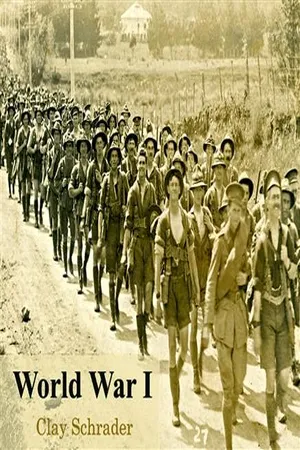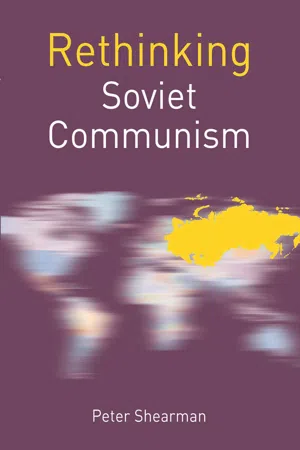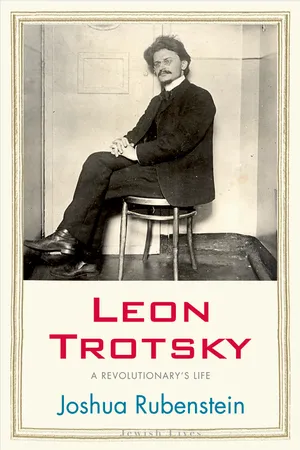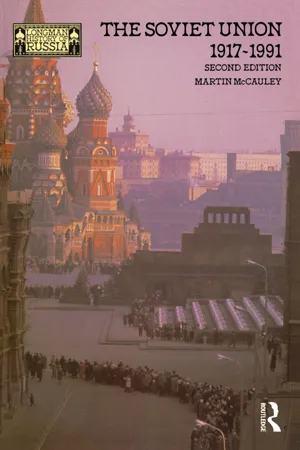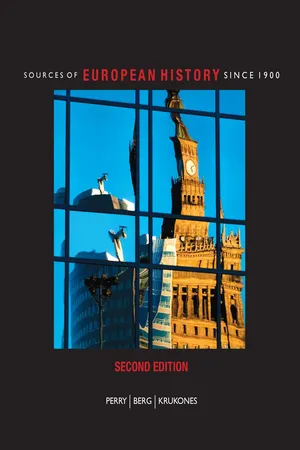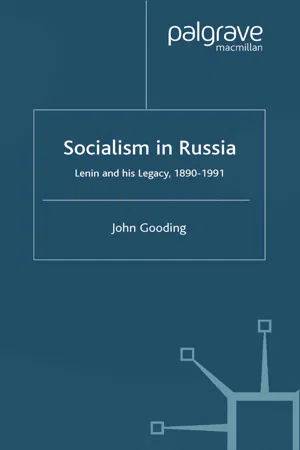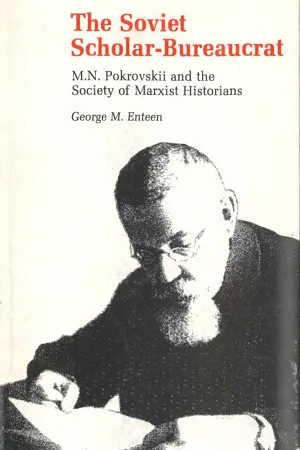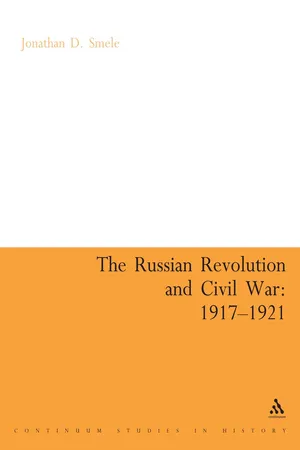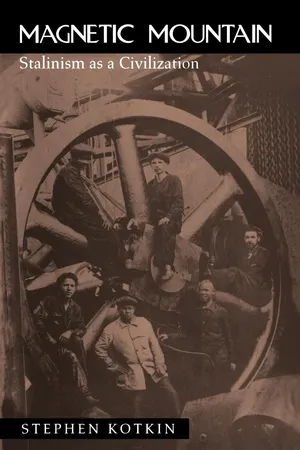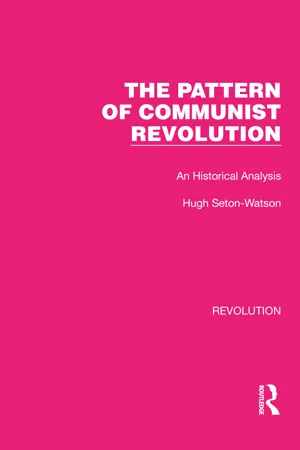History
Bolsheviks Revolution
The Bolshevik Revolution, also known as the October Revolution, was a pivotal event in Russian history in 1917. Led by Vladimir Lenin and the Bolshevik Party, it resulted in the overthrow of the Provisional Government and the establishment of a socialist state in Russia. This revolution marked the beginning of the Soviet era and had far-reaching implications for global politics and society.
Written by Perlego with AI-assistance
Related key terms
1 of 5
12 Key excerpts on "Bolsheviks Revolution"
- No longer available |Learn more
- (Author)
- 2014(Publication Date)
- White Word Publications(Publisher)
The October Revolution was led by Vladimir Lenin and was based upon Lenin's writing on the ideas of Karl Marx, a political ideology often known as Marxism-Leninism. It marked the beginning of the spread of communism in the twentieth century. It was far less sporadic than the revolution of February and came about as the result of deliberate planning and coordinated activity to that end. Though Lenin was the leader of the Bolshevik Party, it has been argued that since Lenin was not present during the actual takeover of the Winter Palace, it was really Trotsky's organization and direction that led the revolution, spurred by the motivation Lenin instigated within his party. Critics on the Right have long argued that the financial and logistical assistance of German intelligence via their key agent, Alexander Parvus was a key component as well, though historians are divided, for the evidence is sparse. ________________________ WORLD TECHNOLOGIES ________________________ On 7 November 1917, Bolshevik leader Vladimir Lenin led his leftist revolutionaries in a revolt against the ineffective Provisional Government (Russia was still using the Julian Calendar at the time, so period references show a 25 October date). The October revolution ended the phase of the revolution instigated in February, replacing Russia's short-lived provisional parliamentary government with government by soviets, local councils elected by bodies of workers and peasants. Liberal and monarchist forces, loosely organized into the White Army, immediately went to war against the Bolsheviks' Red Army. Soviet membership was initially freely elected, but many members of the Socialist-Revolutionary Party, anarchists, and other leftists opposed the Bolsheviks through the soviets. When it became clear that the Bolsheviks had little support outside of the industrialized areas of Saint Petersburg and Moscow, they barred non-Bolsheviks from membership in the soviets. - eBook - PDF
- Peter Shearman(Author)
- 2015(Publication Date)
- Red Globe Press(Publisher)
For example, of the delegates to the 5th Congress of the Russian Social Democratic The Rise and Demise of Soviet Communism 27 Labour Party (RSDLP) in 1907, only 34% were Russians: 30% were Georgians, and 23% were Jewish (Lane, 1968, p. 107). It is common to say that Russia has an unpredictable past. There is no single historical narrative of the Russian Revolution. There is a veritable library of books on the Russian Revolution, yet as a seminal event of the twentieth century, there is no single accepted interpretation either of its causes or its consequences. There was always the official “party line” in the USSR, to which Soviet scholars and students were forced to adhere. The official line was at times revised, but there was no room for independent assess-ments and anyone who challenged the orthodox view did so in the clear knowledge that the consequences could be dire. The party line changed according to the perceived interests of the party hier-archy, often during internal struggles for power. Although certain individuals were written out of the drama of the revolution, and others were transformed from revolutionary heroes to “enemies of the people” (one thinks of the fates of Leon Trotsky and Nikolai Bukharin, to take just two prominent examples), October 1917 was portrayed in terms of the inevitable forces of history in line with Marxist, and later Marxist-Leninist theory. Before October 1917 socialist ideas were the preserve of ‘a miniscule stratum of intellectuals and workers. After 1917 they appeared as a political possibility to millions across the world’ hence the fall of Petrograd was a “universal event” (Ali, 1984, p. 17). Introduction: Defining Revolution When discussing any revolution it is first necessary to recognize, even in the absence of strong ideological biases, that political scientists will often dispute the meaning of important concepts. - eBook - PDF
Leon Trotsky
A Revolutionary's Life
- Joshua Rubenstein(Author)
- 2011(Publication Date)
- Yale University Press(Publisher)
4 The Revolution of 1917 Speaking before tsarist judges in 1905 , Trotsky de-clared, “A popular insurrection cannot be staged. It can only be foreseen.” Twenty-five years later, in forced exile and anxious to defend the role he had played in the Bolshevik takeover, Trotsky wrote his History of the Russian Revolution. Caught be-tween the urge to sustain the Bolshevik claim that the masses had inspired the seizure of power and the unavoidable truth of his and Lenin’s fundamental roles, Trotsky wavered. He em-phasized the inevitable momentum of events—“Revolution is the inspired frenzy of history,” he wrote in My Life —and the contingent need for Bolshevik leadership. He could not claim otherwise. History, in the end, will have to agree with the more candid admission in his diary of 1935 . “Had I not been present in 1917 in Petersburg, the October Revolution would still have taken place— on the condition that Lenin was present and in com-mand [translator’s italics]. If neither Lenin nor I had been pres-83 ent in Petersburg, there would have been no October Revolu-tion.” The revolution might have been made without Trotsky, but it needed both Lenin and Trotsky to succeed. In May 1917 Trotsky returned to a Russia in turmoil. The tsar had abdicated in the wake of violent demonstrations, in-dustrial strikes, and mutinies by soldiers and sailors. Protests over lack of bread turned into a revolution. The Petrograd Soviet of Workers’ Deputies, which had once been led by Trotsky, declared its revival. On March 1 the Soviet issued its famous Order No. 1 , granting soldiers democratic rights and calling on officers to treat them with greater respect. The next day, the Provisional Government assumed power in Petrograd, leaving Tsar Nicholas II no choice but to abdicate. Russia seemed poised to establish a parliamentary repub-lic. The Provisional Government represented the coming to power of a potentially democratic Russia. - eBook - ePub
- Martin Mccauley(Author)
- 2014(Publication Date)
- Routledge(Publisher)
Gradually the euphoria of victory gave way to the sober realisation that there were no short cuts to a better life for all, to justice, democracy and freedom on a national scale. A revolution whose success was based on seizing and maintaining political power gradually became one in which the needs of the economy became paramount. The desperate struggle to find the inputs to keep the wheels of industry turning; the confrontation with the peasants; the need to build a Red Army from scratch to win the Civil War; all contributed to the death of democracy. Economic necessity, the ever present shortages and urban hunger, meant that all became dissatisfied. The upsurge of idealism and hopein October when Lenin had envisaged that a republic of soviets would run Soviet Russia, rapidly gave way to a dictatorship of the Party. Factory committees, trade unions, soviets of workers' and peasants' deputies, all fell victim to the overriding, overpowering need to find an institution which would follow willingly every twist and turn of Bolshevik policy. The only institution which was capable of playing such a role was the Russian Social Democratic Labour Party (Bolsheviks) or as it became known at the VIIth Congress in March 1918, the All-Russian Communist Party (Bolsheviks). The Bolsheviks when they took power in October 1917 presented it to the IInd Congress of Soviets and thus transformed Russia into Soviet Russia. In less than a year, however, power had slipped from the soviets into the safekeeping of the Communist Party. The revolution which had signalled not socialism overnight for Lenin but the dictatorship of the proletariat revealed its true colours. Not soviet democracy but a dictatorship — and since the Communist Party claimed to be the vanguard of the proletariat — a dictatorship of the Communist Party. THE BOLSHEVIKS SEIZE POWER The IInd Congress of the Soviets of Workers' and Soldiers' Deputies convened in Smolny in Petrograd at 10.40 p.m. on 7 November 1917 - eBook - PDF
Sources of European History
Since 1900
- Marvin Perry, Matthew Berg, James Krukones, , Marvin Perry, Matthew Berg, James Krukones(Authors)
- 2010(Publication Date)
- Cengage Learning EMEA(Publisher)
Section 4 The Bolshevik Revolution 99 This means, not only that we must combat na-tional chauvinism, but that an incipient move-ment in a young country can be successful only if it makes use of the experiences of other coun-tries. In order to make use of these experiences it is not enough merely to be acquainted with them, or simply to copy out the latest resolu-tions. What is required is the ability to treat these experiences critically and to test them in-dependently. He who realises how enormously the modern working-class movement has grown and branched out will understand what a re-serve of theoretical forces and political (as well Without revolutionary theory there can be no revolutionary movement. This idea cannot be insisted upon too strongly. . . . Yet, for Russian Social-Democrats the importance of theory is enhanced by three other circumstances, which are often forgotten: first, by the fact that our Party is only in process of formation, its features are only just becoming defined, and it has as yet far from settled accounts with the other trends of revolutionary thought that threaten to divert the movement from the correct path. . . . Secondly, the Social-Democratic movement is in its very essence an international movement. Lenin’s vision of a revolutionary movement tailored to the special conditions of Russia led to a split within Russian Marxism in 1903. Those who shared his belief in the need of a secret, conspiratorial party he dubbed Bolsheviks (“people of the majority”); his opponents, who held to the notion of a broadly based politi-cal organization, became Mensheviks (“people of the minority”). For years, Lenin tried to maintain the ideological unity of the Bolsheviks by means of countless publications and periodicals, many of them written from his place of self-imposed exile in Geneva. By 1917, he had begun to doubt the possibility of revolution in his own lifetime. - eBook - PDF
Socialism in Russia
Lenin and His Legacy, 1890-1991
- J. Gooding(Author)
- 2001(Publication Date)
- Palgrave Macmillan(Publisher)
3 The Realization, 1917–24 1 The October Revolution was a gamble, an enormous leap into the dark. Towards the end of his life, Lenin admitted that he had under- taken it in the spirit of Napoleon – ‘On s’engage et puis ... on voit.’ It was a Marxist leap of course, yet a Marxist leap of a very peculiar kind; and in another remarkable admission Lenin would concede that the Bolsheviks had ‘started from the opposite end to that prescribed by theory’. 1 The western path to socialism by way of capitalism and bourgeois democracy was not a path to be followed inflexibly, and Russian circumstances had required something different. Far from waiting for the socio-economic and cultural conditions necessary for socialism to ripen, the Bolsheviks had taken power with the aim of hastening the maturation process. The political revolution, which should have come as the culmination of the process of change leading to socialism, had thus occurred in advance of the conditions which should have created it. ‘Things have turned out differently from what Marx and Engels expected, and we, the Russian working and exploited classes, have the honour of being the vanguard of the international socialist revolution ...’ 2 The reason for this inversion, or so Lenin argued, was that Russia’s very backwardness had made the socialist revolution easier to accom- plish there than in the west. Yet it was important not to be deceived by the ease with which the revolution had been carried off. Backwardness might have facilitated the socialist revolution in Russia, but it would also, Lenin emphasized, make the actual creation of socialism there very much harder than elsewhere. 3 The gamble had taken the Bolsheviks into territory that was almost 62 entirely uncharted. For there had been no Marxist revolution before, still less an inverted Marxist revolution. Precedent and practical guid- ance were wholly lacking, and not even much theoretical help could be got from Marx and Engels. - eBook - ePub
Revolutionary Democracy
Emancipation in Classical Marxism
- Soma Marik(Author)
- 2018(Publication Date)
- Haymarket Books(Publisher)
7 BOLSHEVISM IN 1917Since Marx, Engels, the Social Democracy, and Bolshevism alike subscribed to the view that the socialist party was an instrument of the proletariat in its struggle for emancipation from the tyranny of capital, it is necessary to study the strategy, as well as the organizational structure and functioning of Bolshevism in 1917—the moment of truth not only for Russian socialists of all hues, but for all who profess socialist creeds of any kind the world over. Yet what is most significant in any study of the events that happened in Russia in that year, is the yawning chasm between most recent specialized academic historiography and the received wisdom of the age—which includes hostile historians who have allowed their outlook to mar their objectivity. Rigorous academic research has substantially vindicated the Bolshevik claims about their adherence to workers’ democracy (a statement which should not be confused with the belief that any apologia for Stalinist interpretations will be accepted as a good narrative). But at the same time, even many socialists and communists of earlier years have since 1991 increasingly joined the bandwagon of those who claim that the October Revolution was a coup, and that Bolshevism led ineluctably to Stalinist authoritarianism.How did Lenin and his supporters, who had rejected all talk of going beyond the bourgeois democratic stage in 1905, shift to a call for socialist revolution while retaining their commitment to a majority revolution? What sort of democratic class and party relations were worked out in course of mass mobilizations in 1917? How were Soviets reconceptualized in Bolshevik theory and in organizational outlook?Another question, whose answer will be sought in connection with the discussion on class and party relationship, as well as in connection with the October insurrection, is the question of the role of violence. In the discussion on Marx’s strategy of revolution, a distinction was made between the possibility of violence to put down the minority who own the means of production and who may refuse to submit to the majority when basic class interests are at stake, and the valorization of violence. It is necessary to examine afresh the widely held “self-evident” view that Bolshevism did not care for democratic norms and was committed to violence as a matter of course. - eBook - PDF
The Soviet Scholar-Bureaucrat
M. N. Pokrovskii and the Society of Marxist Historians
- George M. Enteen(Author)
- 1991(Publication Date)
- Penn State University Press(Publisher)
Lenin began writing the history of the Revolution, according to Pokrov- skii's new account, twelve years before the event. In 1905 he predicted that the complete victory of the Revolution would be the establishment of a revolutionary-democratic dictatorship, which would mark the beginning of the struggle for socialism. When Lenin returned to Russia in 1917, he was armed not with a new theory but rather with a more specific and Evolution of Pokrovskii's System detailed version of the original one. This theory of revolution, though skeletal, guided Lenin's actions, and his actions provided experience for theorizing. A more detailed plan was possible in 1916 owing to new cir- cumstances, first of all the imperialist war, which "to an immense degree brought closer the socialist revolution throughout the entire world" (1927b:4, 10). The means for connecting the bourgeois republic and the socialist revolution were becoming evident to Lenin, who thus "was the first author since Marx of a genuine theory of permanent revolution." By February 1915 Lenin foresaw an impending struggle for socialism in Rus- sia. The immediate task was still the bourgeois revolution, but when he asserted the need for the separate organization of the rural proletariat, he was preparing for the socialist overturn. By 1916 Lenin saw some of the major characteristics of the socialist revolution. Pokrovskii quoted Lenin's "Results of the Discussion of Self-Determination," which ap- peared on the eve of the Revolution: He who awaits a "pure" [entirely proletarian] social revolution, will never get to see it. . . . The socialist revolution in Europe cannot be anything other than an explosion of mass struggle on the part of all the oppressed and dissatisfied. Portions of the petty bourgeoisie and backward workers will inevitably participate in it . . . and will inevitably bring with themselves into the move- ment their prejudices, their reactionary fantasies, their weak- nesses and errors. - eBook - PDF
The Russian Revolution and Civil War 1917-1921
An Annotated Bibliography
- Jonathan Smele(Author)
- 2006(Publication Date)
- Continuum(Publisher)
19 The Bolsheviks DOCUMENTS 3358 The Bolsheviks and the October Revolution: Central Committee Minutes of the Russian Social-Democratic Labour Party (Bolsheviks), August 1917± February 1918 (transl. by A. Bone). London: Pluto Press, 1974. x + 331 pp. Translated from the second Russian edition, which was prepared by the Institute of Marxism-Leninism and published in 1958, this work constitu-tes the most important single volume of source material on the Bolsheviks from the time of the October Revolution to the Treaty of Brest-Litovsk. The unnamed Trotskyist editors of this edition have included the extensive notes and the documents (mostly by Lenin) additional to the Central Commit-tee minutes which the Institute added, together with further rather superfluous annotation by Tony Cliff. See also Migliardi, G. `I protocolli del Comitato Centrale. 1917±1918', Istituto Giangiacomo Feltri-nelli: Annali Vol. 3 (1960), pp. 781±802. 3359 `Events and Facts: October 24±December 25 1917', Political Archives of the Soviet Union Vol. 1 (1990), No. 1, pp. 5±20. `Events and Facts: January 1±March 8 1918', Political Archives of the Soviet Union Vol. 1 (1990), No. 2, pp. 189±212. `Events and Facts: March 8±May 4 1918', Political Archives of the Soviet Union Vol. 1 (1990), No. 4, pp. 393±406. `Events and Facts: June 21 1918±January 31 1919', Political Archives of the Soviet Union Vol. 2 (1991), No. 1, pp. 49±86. `Events and Facts: September 22±29 1920', Political Archives of Russia Vol. 2 (1991), No. 4, pp. 225±236. `Events and Facts: October 1±15 1920', Political Archives of Russia Vol. 2 (1991), No. 4, pp. 237±242. `Events and Facts: December 20 1920', Political Archives of Russia Vol. - eBook - PDF
Magnetic Mountain
Stalinism as a Civilization
- Stephen Kotkin(Author)
- 1997(Publication Date)
- University of California Press(Publisher)
It was this sensibility that gave such force to the slogan peace, land, and bread (and the less frequently cited national self-determination) and with which the Bolsheviks' class language and view of the world remained in partial overlap even after their almost immediate betrayal of the 1917 slo-gans in the all-out struggles for political supremacy. To be sure, the Bolsheviks' apparent betrayal of one of the revolution's core principles—popular sovereignty—induced various groups of revolu-tionaries to take up arms against them in defense of the revolution. But the efforts by White armies to restore landowner rights, and the misguided in-tervention and half-hearted support for the Whites by the imperialist powers (ostensibly to force Russia back into the war), pushed much of the mass of everyday revolutionaries into the Bolshevik camp. The place to look for the social support of the October revolution is less in the rad-icalization of 1917 and the supposed feelings of the workers toward the sei-zure of power than in the formation and operation (in 1918 and after) of 14 / Introduction the Red Army, 54 and even more so, in the staffing of the rapidly expanding, new state institutions by tens of thousands of white-collar functionaries. 55 In sum, the Civil War not only gave the daring, opportunistic Bolshe-viks a modus operandi and helped solidify their still amorphous identity as the consummate builders of a socially oriented, powerful state; it also fur-thered the process whereby the Bolsheviks' being in power came to be identified with the cause of the revolution. In elections immediately fol-lowing the seizure of power, the Bolsheviks garnered little support among the peasantry (the overwhelming bulk of the population) and failed to win the allegiance of many workers—the groups in whose name they had seized power. - eBook - ePub
The Pattern of Communist Revolution
An Historical Analysis
- Hugh Seton-Watson(Author)
- 2022(Publication Date)
- Routledge(Publisher)
Its leading figure was Trotski, who had returned to Russia soon after Lenin, had found himself in complete agreement with him on policy and tactics, and had formally joined the Bolshevik party in July. The Committee efficiently performed its task of placing men in key posts in the army units to ensure their obedience to its orders. On 7th November the insurrection took place. 1 The government was defended only by a few hundred soldiers. Not all troops obeyed the Bolsheviks, but those who did not, simultaneously refused to obey Kerenski. The Cossacks hated Kerenski, who had beaten their hero Kornilov, more than the Bolsheviks, whom they did not consider a serious threat. In Moscow there was fighting for four days, in Kazan and Saratov a few shots were fired. Within a few days the government set up by the Bolsheviks was recognised in northern and central Russia, and during November in Siberia. 1 I have used throughout this chapter the dates of the European (Gregorian) calendar. By the Julian calendar, in use in Russia until 1918, the date of the Bolshevik seizure of power was 25th October. It is therefore usually referred to as the ‘October Revolution’. The same difference in date causes its predecessor to be known as the ‘February Revolution’. I find it more convenient to use the terms ‘March Revolution’ and ‘November Revolution’. Readers are warned, to avoid confusion. The Constituent Assembly The first round had been won, but only the first round. The next problem before Lenin was the Constituent Assembly. He had always urged that the election should be quickly held, and having seized power he could hardly call it off. Besides it seems that he genuinely believed that the Bolsheviks would do very well in it. Polling took place at the end of November. In the big cities there was much intimidation against the liberals, but socialist parties were not on the whole persecuted. The results disappointed the Bolsheviks - eBook - ePub
A Documentary History of Communism in Russia
From Lenin to Gorbachev
- Robert V. Daniels(Author)
- 2001(Publication Date)
- University Press of New England(Publisher)
Works, Vol. 17, part 1, Moscow, 1926, pp. 157–58, 161–62, 170–71; editor’s translation).Lenin on Economic Expediency
Once established in power, Lenin reconsidered the Bolsheviks’ utopianism regarding both internal and international revolution. In an extensive statement on the transitional economic order, he returned to the principal features of large-scale capitalistic industry—individual managerial authority, labor discipline and piecework incentives, and the employment of “bourgeois” managers and technical experts.Thanks to the peace which has been achieved—notwithstanding its extremely onerous character and extreme instability—the Russian Soviet Republic has received an opportunity for a certain period of time to concentrate its efforts on the most important and most difficult aspect of the socialist revolution, namely, the organizational task. . . .. . . In every socialist revolution—and consequently in the socialist revolution in Russia which we began on October 25, 1917—the principal task of the proletariat, and of the poor peasantry which it leads, is the positive or constructive work of setting up an extremely intricate and delicate system of new organizational relationships extending to the planned production and distribution of the goods required for the existence of tens of millions of people. Such a revolution can be successfully carried out only if the majority of the population, and primarily the majority of the toilers, engage in independent creative work as makers of history. Only if the proletariat and the poor peasantry display sufficient class consciousness, devotion to principles, self-sacrifice and perseverance will the victory of the socialist revolution be assured. By creating a new, Soviet type of state, which gives the opportunity to the toiling and oppressed masses to take an active part in the independent building up of a new society, we solved only a small part of this difficult problem. The principal difficulty lies in the economic sphere, viz., the introduction of the strictest and universal accounting and control of the production and distribution of goods, raising the productivity of labour and socializing production in actual practice.
Index pages curate the most relevant extracts from our library of academic textbooks. They’ve been created using an in-house natural language model (NLM), each adding context and meaning to key research topics.
